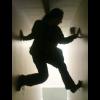You know the spiel; 'we spend a third of our lives sleeping, so it is bizarre that there is so little research on natural sleeping positions'.
There is an abundance of research on sleeping positions in general, but it all carries the assumption that we all must sleep on a mattress, usually with a pillow.
It has bees suggested, for example, that a prone sleeping position should be avoided at all costs because it causes an exaggerated arch of the lumbar spine. Well, of course it does if you're sleeping on a big, cushy mattress, allowing your heavy pelvic area to sink down. What if you eliminate the mattress? Unfortunately, I was unable to find any applicable and comprehensive research on this topic
The one piece of literature - though of questionable quality - I was able to find on instinctive sleeping positions is this:
http://www.ncbi.nlm....les/PMC1119282/
It advocates sleeping on one's front (or side) with no mattress, no pillow and usually pron with the head turned to one side, supported by the hands or ground. Unfortunately, this one study does not provide enough material to make any valid conclusions. In the prone position examples, pressure to the masseter or mandible could promote bruxism and TMJ, while interfering with the natural swallowing response. (I'll try to find the articles on request) Pressure to the maxilla, I speculate, could cause sinus problems, and pressure around temple area may cause pressure on the eyeball - the ramifications of which I do not know. Furthermore, it could be reasonably speculated that having one's head turned to the side for an entire night could cause excessive stress on the cervical spine.
There are, then, two questions: what is, generally speaking the healthiest sleeping position? And, how, and where, did paleolithic humans sleep?












































